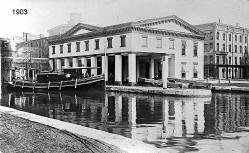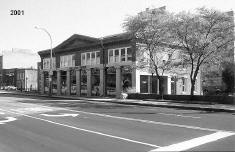|
The Weighlock Building |
Erie Boulevard East and Montgomery StreetWhen the Erie Canal was completed in 1825 it was the largest public works project ever undertaken by the young nation. Traversing New York State -- from New York City to Buffalo -- it dramatically reduced shipping costs, turning New York Harbor into America's number one port. Cities along the canal flourished, including Syracuse. The building in the pictures below is the last of three weigh-lock buildings constructed on this site. The first was built in 1828, the second in 1834 and this final building in 1850. (Continued Below) (Click thumbnail image for enlargement) Download 1903 high-resolution image (17 meg.) The Weighlock building was used to weigh canal boats as they passed, charging them according to the weight of their cargo. After a boat was drawn into the lock beneath the overhang, the water gates were closed at each end, the water was drained out, and the boat settled onto a massive cradle suspended from the balance beam overhead. The registered weight of the boat was subtracted from the measured weight to determine the weight of the cargo. Canal tolls were abolished in 1883. In 1905 the scales were removed from the building and the upper floor was extended over the lock to provide more drafting room for the state's new "Good Roads" program. In the 1950's Syracuse officials discovered, much to their surprise, that the state planned to route the new Interstate 81 right through the center of the city, taking out -- among other landmarks -- the Weighlock Building and City Hall. Community leaders successfully fought this plan and the Weighlock Building was converted to the Erie Canal Museum in the mid-1960's. Click here to see another Weighlock Now & Then comparison Click here to see
additional Weighlock photos To learn more about the Weighlock Building and the history
of the canal, visit the |


